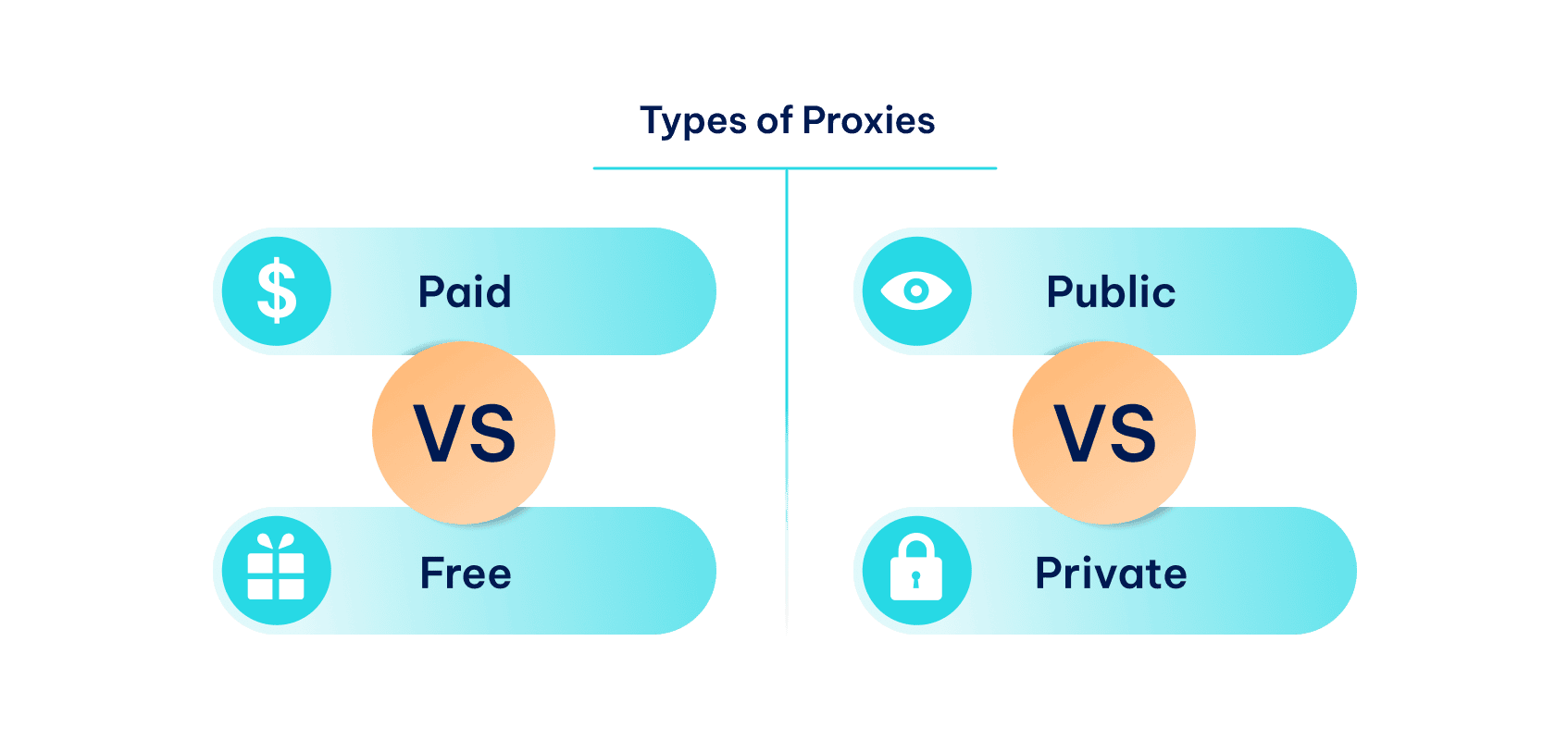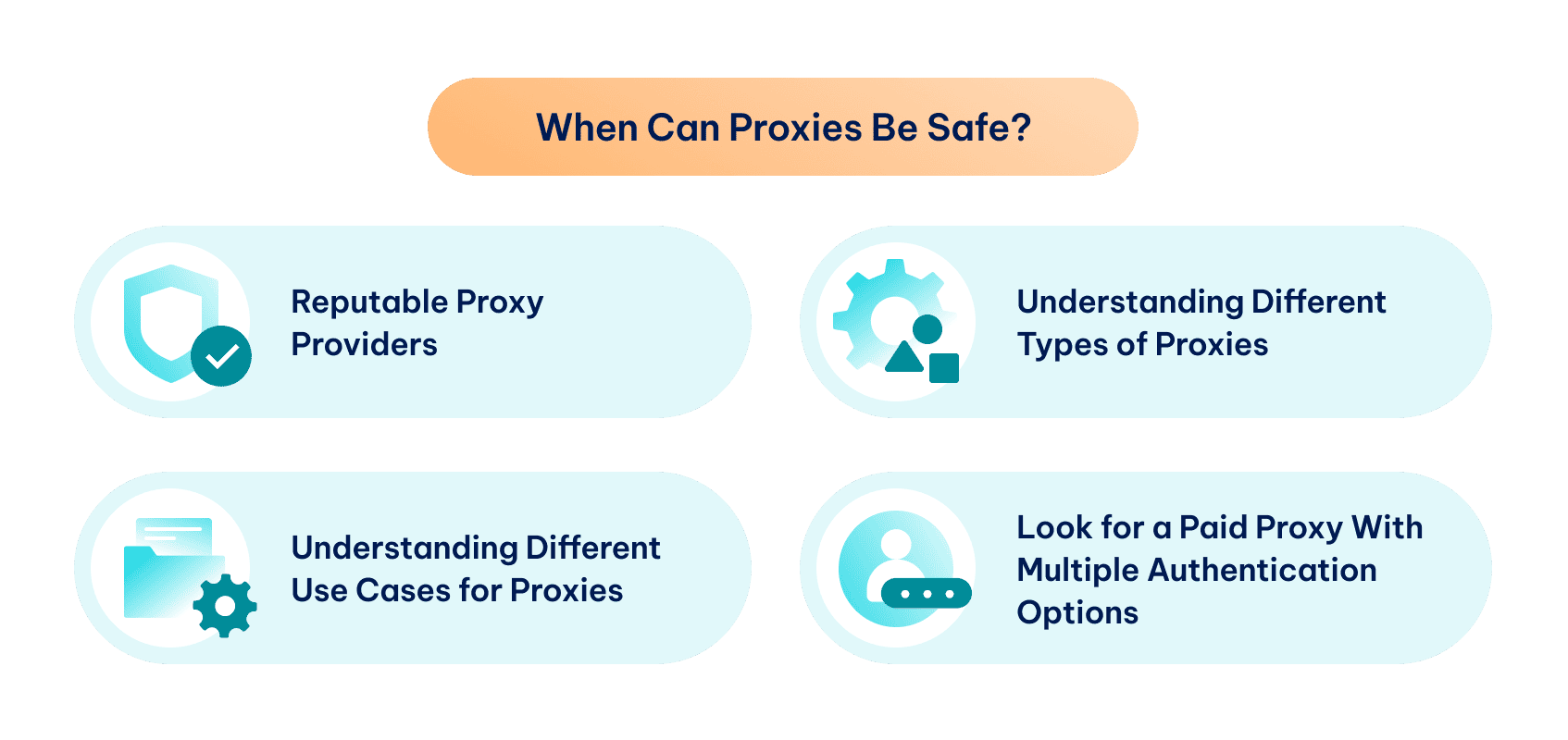Are Proxies Safe? A Guide to Secure Proxy Usage
News

Simona Lamsodyte
Engaging in online activities brings risks everyone has started considering more seriously. And for good reason. The lack of privacy and security while browsing the web from home or work can damage your reputation, finances, and overall well-being.
This is why many people and businesses started using various tools to boost their privacy and security - proxy servers being one of the most popular. Proxies provide an easy way to safeguard your online privacy and efficiently handle critical tasks like web scraping, ad verification, and market research. However, are proxies safe?
The truth is that they can cause the opposite if not chosen or used correctly. Although concerns about safety often revolve around the use of free proxies, not all paid options are created equal. In fact, there are several factors to consider when selecting a proxy service to ensure secure usage.
But don’t worry. We’ll cover everything you need to know about secure proxy usage. Let’s start from the beginning and explain what these tools are and how they work.
What Are Proxies?
A proxy server functions as a gateway between internet users like you, and the rest of the internet. To put it more simply, it’s a middleman between you and the websites and services you plan to visit or use.
Just like any other internet-connected device, a proxy server has its own IP address that identifies it on the web. So when using a proxy, you’re actually using its IP address to connect to your target websites rather than yours.
Let’s explain the inner workings of proxies. Instead of connecting to your desired web sources directly, your web requests go to the proxy server, which forwards them on your behalf. This way, the proxy shields your original IP address, location, and other information that reveals your online identity.
It’s how proxies ensure anonymity and privacy on the internet, adding a security layer that protects your device, online identity, and data.
However, the amount of privacy and anonymity they provide depends on the proxy type, among other factors.
Types of Proxies
There are many proxy types out there, but we’ll focus on the most important ones to help you pick the safest option.

Paid Proxies vs. Free Proxies
The main difference between paid proxies and free proxies is obvious: with paid ones, you have to pay to use them, while with free proxy services, you don’t pay anything. But there’s so much more to consider than just the cost factor.
A free proxy service is easy to find and is always available. However, no one controls who uses them, so anything can happen. They tend to be overused and misused. That’s why free proxy services are usually the most prone to vulnerabilities and instability.
A paid proxy comes with many features and benefits you can’t get with free proxies, such as HTTPS and SOCKS5 support and responsive customer support. They are mostly run by companies that invest in their infrastructure to provide high-quality IPs. The proxies are monitored to ensure no one is abusing them, ensuring a clean pool for their users.
Since they are paid, these proxies are only available to users who pay for them, as opposed to free proxies that can be used by countless users simultaneously. This is why paid proxy addresses tend to be faster, more reliable, and perform better.
Public Proxies vs. Private Proxies
Public proxies are free proxies, as they are available to anyone for free. At the same time, private proxies are operated by companies, so you can consider them as paid proxies.
Now, a private proxy can be dedicated or shared. Dedicated proxies are IPs dedicated exclusively to one user at a time, providing complete control over how and when they are used. On the other hand, shared proxies are shared between many users at the same time.
When paying for a shared proxy server, it’s crucial to buy it from a company that vets its clients to avoid security risks when using it.
Are Proxies Safe? Exploring Security Risks
So far, you’ve probably realized that paid proxy servers are generally safe to use, although it depends on the proxy provider. Nevertheless, we’ll talk more about that later.
On the other hand, free proxy servers come with many security risks. This proxy type offers little to no protection from outside threats, such as traffic interceptions, malicious software attacks, or data breaches.
Therefore, using a free proxy service will make you more vulnerable to security risks that can compromise your online security and privacy.
Let’s explore the most significant risks of using a free proxy server.
Lack of Transparency
Unlike paid proxies, which are owned and controlled by companies, free proxy servers can belong to anyone. You don’t know where they come from, who sets them up, and for what purpose. You have no idea whose device your online traffic is going through, as they can be anywhere.
You also don’t know whether the connection is shared with others or if that particular IP is banned on most websites and services. And even if the free proxy provider claims the proxies are, let’s say, residential, they can easily be another proxy type.
Viruses and Malware Infections
Some proxy providers may offer proxy servers for malicious purposes, such as altering traffic, compromising email communication, or installing viruses.
This way, they can spread malware to your device, including ransomware installations, eavesdropping software, and password-stealing and keylogging tools.
Data Leakage
Many free proxy servers are set to monitor their users’ connections. Those behind these proxies may use them to gather and sell your data to anyone willing to pay for it. While ad companies and agencies are potential buyers, hackers and malicious actors can also pay for your data.
By leaking your personal or business data, free proxy servers increase your risk of data breaches and identity theft , which can ruin your reputation and result in financial losses.
When Can Proxies Be Safe?
Now that you know the dangers of using free proxies, let’s explain when proxies are considered safe to use.

Reputable Proxy Providers
Proxy servers are safe to use only when bought from reputable, best proxy providers with clear business practices.
So, if you want secure proxy servers, consider only proxy providers that use ethical IP sourcing and comply with the latest legal and data protection regulations, such as GDPR. This way, you can be sure that your proxies are both safe and legally and ethically compliant.
Also, find out if the company regularly monitors its proxy network and has a KYC policy to ensure the proxies are safe to use.
Understanding Different Types of Proxies
Choosing secure proxy servers requires understanding the different types of proxies as well.
In general, residential proxies are considered the most trustworthy, However, you should first check if the provider is open about its IP sourcing methods and the way it manages, stores, and shares your information. So, make sure you review its Terms of Service and Privacy Policies documents before buying any residential proxies.
Datacenter, ISP, and premium mobile proxies can also be a safe option, but only if they come from reliable sources. While you can find both dedicated and shared options, the first is always a safer option. That’s because you’re not sharing the proxies with anyone else, so you don’t have to feel the consequences of someone else’s actions.
Who knows, maybe the person you’re sharing the IP addresses with is involved in data breaches or any other illegal or malicious activity that can embroil you in legal issues.
Understanding Different Use Cases for Proxies
Proxies can be used for all sorts of use cases, both private and business-related. Although choosing a paid proxy over free proxy services is always the safest option, you should also know which type to choose for your particular proxy use case scenario.
For example, if you need proxies for web scraping , go with paid residential or rotating proxies. Since they constantly rotate your IP from a pool of IP addresses, target websites will have an extremely hard time detecting your web scraping activity, minimizing your risk of rate limiting and bans.
Also, refrain from using the proxies for any malicious or illegal activity.
Look for a Paid Proxy With Multiple Authentication Options
For maximum security, choose a paid proxy service that supports dual authentication methods – IP whitelisting and username/password authentication. Even if your credentials get compromised, IP whitelisting will prevent any unauthorized access and use of your proxies.
Conclusion
There are plenty of proxy services out there, each offering a different set of features and benefits. But if you’re looking for the safest option, you should only consider premium providers with ethical IP sourcing, compliance with legal and data protection standards, KYC policy, and clear business practices.
Stay away from free options and shady providers, and opt for companies with a high reputation!
